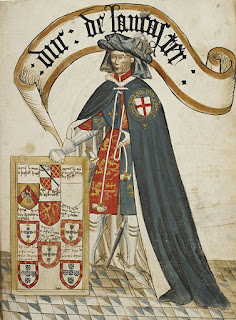He grew up in Newark-on-Trent, which in his lifetime was a fairly large town. It is believed he attended the University of Montpellier; if so, then he may have been exposed to the Practica Chirurgia of Roger Frugard. He was in London in 1370, and was active in the Hundred Years' War in the regiment of Henry Grosmont, Duke of Lancaster, and John of Gaunt (King Edward III's son and Henry's son-in-law). (Incidentally, this would put him in the orbit of a young Geoffrey Chaucer.) He remained an employee of Gaunt.
War creates injuries, and this is where surgeons are most needed and are given opportunities to come up with new ideas for treating people. Long stretches bouncing on horseback can be damaging and lead to an issue now called a pilonidal cyst, but described by Arderne as a fistula in ano ("fistula in anus"). A fistula is a connection between two parts of the body that don't normally connect. You can learn more about this and Arderne's painful-but-successful treatment in this post.
But perhaps not so painful. Arderne knew of the soporific and nerve-deadening effects of opium, and prescribed it so that the patient "shal sleep so that he shal feel no cutting." To the opium he would add hemlock and henbane. He would apply this topically via an enema, and also use it on arrow wounds to deaden the pain while they were extracted.
His innovations were not just in what he was able to do for patients, but also in the profession itself. He believed, for instance, that wealthy patients should be charged what the market would bear, but poor patients should be treated for free. He also suggested ways to con duct oneself as a surgeon, and what to wear. The frontispiece for one of his manuscripts (shown above) shows him dressed in the robes of a university doctor, elevating the status above that of the more mundane "barber surgeon" who (because they possessed razors) were used to quickly treat war-related amputations, blood-letting, and (of course) hair-cutting. Because of the messiness involved, barber surgeons wore short robes. Arderne advised against this, urging his followers to distinguish themselves from the less-educated barbers.
More than 50 medieval manuscripts exist today with his texts, most with multiple illustrations as well. I'll share more of his guide for successful surgeons tomorrow.


.jpg)
